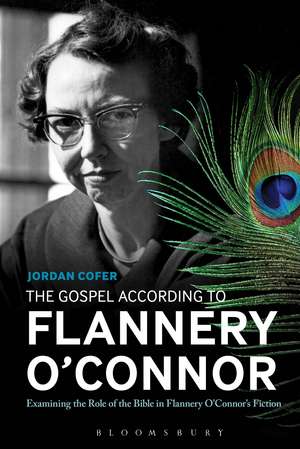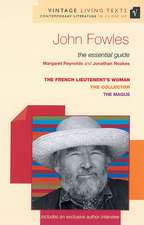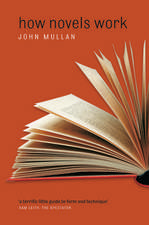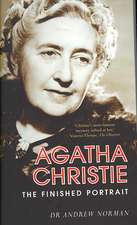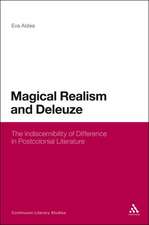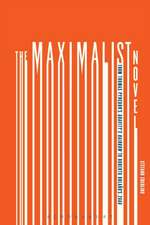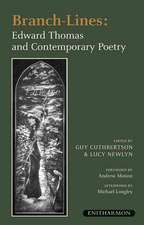The Gospel According to Flannery O'Connor: Examining the Role of the Bible in Flannery O'Connor's Fiction
Autor Dr. Jordan Coferen Limba Engleză Hardback – 18 iun 2014
| Toate formatele și edițiile | Preț | Express |
|---|---|---|
| Paperback (1) | 254.55 lei 6-8 săpt. | |
| Bloomsbury Publishing – 21 oct 2015 | 254.55 lei 6-8 săpt. | |
| Hardback (1) | 770.94 lei 6-8 săpt. | |
| Bloomsbury Publishing – 18 iun 2014 | 770.94 lei 6-8 săpt. |
Preț: 770.94 lei
Preț vechi: 896.45 lei
-14% Nou
Puncte Express: 1156
Preț estimativ în valută:
147.54€ • 153.46$ • 121.80£
147.54€ • 153.46$ • 121.80£
Carte tipărită la comandă
Livrare economică 14-28 aprilie
Preluare comenzi: 021 569.72.76
Specificații
ISBN-13: 9781623560881
ISBN-10: 1623560888
Pagini: 160
Dimensiuni: 152 x 229 x 15 mm
Greutate: 0.36 kg
Ediția:New.
Editura: Bloomsbury Publishing
Colecția Bloomsbury Academic
Locul publicării:New York, United States
ISBN-10: 1623560888
Pagini: 160
Dimensiuni: 152 x 229 x 15 mm
Greutate: 0.36 kg
Ediția:New.
Editura: Bloomsbury Publishing
Colecția Bloomsbury Academic
Locul publicării:New York, United States
Caracteristici
Argues that O'Connor's signature rhetorical staple, her ironic endings, are often biblically based
Notă biografică
Jordan Cofer is Associate Professor of English at Abraham Baldwin Agricultural College, USA.
Cuprins
ContentsAcknowledgementsList of AbbreviationsChapter 1. Towards a New Approach to Flannery O'Connor's FictionChapter 2. Wise Blood as a Primer for O'Connor's Religious VisionChapter 3. From Dishonor to Glory: Biblical Recapitulation in "A Good Man is Hard to Find" and "Judgment Day"Chapter 4. The Terrible Speed of Mercy: Flannery O'Connor's Backwoods ProphetsChapter 5. So The Last Shall Be First, and The First Last: Biblical Reversals in the Fiction of Flannery O'ConnorBibliographyIndex
Recenzii
[This book] sheds fresh light on Flannery O'Connor's characters as well as whetting the appetites of those new to them.
Jordan Cofer's book is the first to examine O'Connor's work in direct connection with Biblical scriptures. Many other Christian readings of her fiction have appeared from the late 1960s forward, but Cofer's is the first close textual analysis. His study, which helps clarify O'Connor's use of the Bible, will be of assistance to students studying her work, professors who guide that study, and anyone interested in the work of the greatest Christian novelist of the 20th century.
Flannery O'Connor read the Bible well, and Jordan Cofer skillfully demonstrates how she adapted scripture-often juggling several sets of allusions at once-to produce some of the greatest fiction of the twentieth century. Far from reductive, Cofer's approach makes O'Connor's fiction seem more subtle and original, more paradoxical, more upsetting.
More than any previous interpreter of Flannery O'Connor, Jordan Cofer attends to the specifically scriptural quality of her fiction-her overt biblical references, her covert biblical allusions, her radical biblical reversals of human expectation, her subtle recasting of biblical characters and stories. Moses and Elijah, Job and Peter, Paul blinded and the Rich Young Ruler sent sorrowfully away: Cofer demonstrates how such biblical figures and events are given compelling new life in Flannery O'Connor's novels and stories.
Jordan Cofer's book is the first to examine O'Connor's work in direct connection with Biblical scriptures. Many other Christian readings of her fiction have appeared from the late 1960s forward, but Cofer's is the first close textual analysis. His study, which helps clarify O'Connor's use of the Bible, will be of assistance to students studying her work, professors who guide that study, and anyone interested in the work of the greatest Christian novelist of the 20th century.
Flannery O'Connor read the Bible well, and Jordan Cofer skillfully demonstrates how she adapted scripture-often juggling several sets of allusions at once-to produce some of the greatest fiction of the twentieth century. Far from reductive, Cofer's approach makes O'Connor's fiction seem more subtle and original, more paradoxical, more upsetting.
More than any previous interpreter of Flannery O'Connor, Jordan Cofer attends to the specifically scriptural quality of her fiction-her overt biblical references, her covert biblical allusions, her radical biblical reversals of human expectation, her subtle recasting of biblical characters and stories. Moses and Elijah, Job and Peter, Paul blinded and the Rich Young Ruler sent sorrowfully away: Cofer demonstrates how such biblical figures and events are given compelling new life in Flannery O'Connor's novels and stories.
